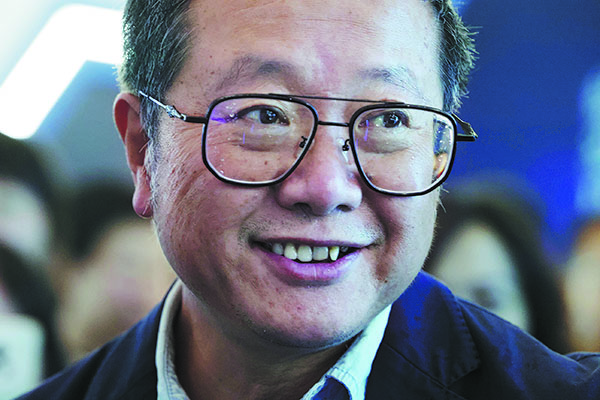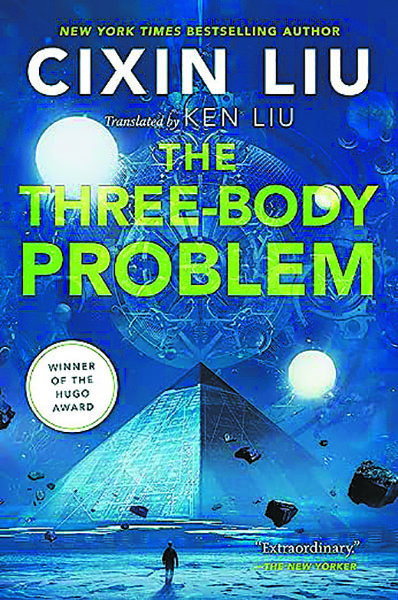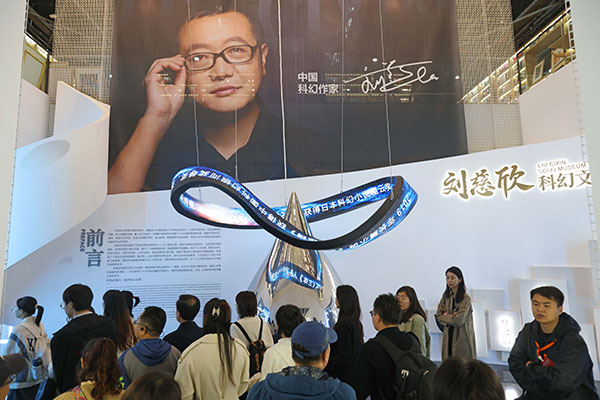Sci-fi author finds productive forces a 'shocking leap'

Chinese sci-fi writer Liu Cixin. [Photo provided to China Daily]
Liu Cixin believes despite misgivings on AI, the right choices can usher in a brand-new era, Yang Yang and Zhu Xingxin report.
New quality productive forces might be related to and shaped by scientific breakthroughs, said Liu Cixin, when asked about his understanding of this concept that is key to China's economic development at the launch ceremony of a celebratory week of sci-fi events in his hometown of Yangquan in Shanxi province on Oct 13.
Liu, born in Beijing, moved with his parents to Yangquan when he was a child. At 22, he started working at the Niangziguan Power Plant in Shanxi. In June 1999, he published his first short stories including The Whale's Song in Science Fiction World magazine. In 2006, his novel The Three-Body Problem was serialized in the magazine.
A representative of sci-fi in contemporary China, Liu, 61, has written 40 short stories and seven novels, including the best-selling novels The Three-Body Trilogy, Ball Lightning and Supernova Era and short stories such as The Wandering Earth, Time Migration and The Village Teacher.
In 2015, The Three-Body Problem, the first volume of The Three-Body Trilogy, translated by Ken Liu, won the Hugo Award for best novel at the 73rd World Science Fiction Convention, making Liu the first Asian to receive this award. So far, the trilogy has been translated into 35 languages, selling more than 4 million copies overseas.
At the ceremony, he said, "Artificial intelligence might exert great influence on productive forces, boosting them – or a more complicated influence."
Liu cited the 2024 Nobel Prize winners for chemistry for example, of whom Demis Hassabis and John Jumper were awarded for the AI model they created that fundamentally changes the way a protein's structure is studied. He said that, in the past, it might have taken scientists years to crack one protein's structure, but AI can crack nine proteins within one second, which is what is called new quality productive forces. "It's a shocking leap. Its biggest meaning is that it changes ways of doing scientific studies and also our ways to learn the laws of the cosmos and nature," he says.
Another technology that comes out of sci-fi works is self-driving technology, he says. In Wuhan, Hubei province, Baidu's Apollo Go robotaxi service has raised concern among taxi drivers.
When a new technology replaces an old one, it will always cause fluctuations, Liu said. For instance, at the start of the 19th century, the Luddite Movement took place in Britain, in which organized British workers destroyed the textile machinery that was displacing them, he said.
"Now we are facing a similar historical turning point. But if we can make the right choices, we can usher in a brand-new era of new quality productive forces," he said.
Liu's works have been adapted into movies, TV series and comic books, including the movie adaptations of The Wandering Earth in 2019 and The Wandering Earth II in 2023, and two TV drama adaptations of The Three-Body Problem, released by Chinese streaming platform Tencent Video and the United States' Netflix.
"Both adaptations, targeting different audiences in China and overseas, are successful for me. I expect bigger success in the adaptations of the next two volumes," he said.

Cover of the English version of Liu's novel The Three-Body Problem. [Photo provided to China Daily]
When readers asked whether there will be sequels to The Three-Body Trilogy, Liu said that the story is complete.
"Judging from my age, I can only write for another 10 years, not very long. I want to try out some new and different ideas. I'm not sure whether I can complete the novels or they are worth publishing, but I have been trying hard to write," he said.
In the years since Liu won the Hugo Award, the sci-fi industry in China has kept growing. At the 82nd World Science Fiction Convention in August, Chinese authors received a record nine nominations.
The 2024 China Science Fiction Industry Report shows that in 2023, the industry generated 113.29 billion yuan ($15.93 billion), surpassing 100 billion yuan for the first time.
At the same ceremony, the Liu Cixin Sci-fi Museum was launched. Located in a cultural park in Yangquan, the 700-square-meter museum presents a space for audiences to learn about Liu's life, writing and achievements as well as the adaptations of his works.
Yan Jingming, vice-president of the China Writers Association, said that he hoped the museum will be an inspirational source for more sci-fi creations.

Visitors at the recently launched Liu Cixin Sci-fi Museum in Yangquan, Shanxi province. [PHOTO BY ZHU XINGXIN/CHINA DAILY]



